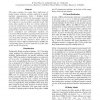Free Online Productivity Tools
i2Speak
i2Symbol
i2OCR
iTex2Img
iWeb2Print
iWeb2Shot
i2Type
iPdf2Split
iPdf2Merge
i2Bopomofo
i2Arabic
i2Style
i2Image
i2PDF
iLatex2Rtf
Sci2ools
114
click to vote
ISLPED
1996
ACM
1996
ACM
Energy delay analysis of partial product reduction methods for parallel multiplier implementation
This paper examines the energy delay implications of partial product reduction methods employed in parallel multiplier implementations. Radix 4 Modified Booth Algorithm (MBA) is currently the most popular choice for partial product reduction in parallel multipliers although 4:2 compressors can also produce equivalent results. Our energy delay analysis of these two schemes taking into account the architectural as well as circuit implementation issues suggests the superiority of the 4:2 compressor based partial product reduction technique as far as circuit delays, power consumption and architectural regularity are concerned. SPICE simulations of partial product generation using these schemes for an 8 bit multiplier suggest a worst case energy delay advantage of the order of 36% and 15% respectively for the 4:2 compressor based scheme in comparison with two different implementations of MBA. The corresponding figures for power reduction are of the order of 26% and 11% respectively.
| Added | 08 Aug 2010 |
| Updated | 08 Aug 2010 |
| Type | Conference |
| Year | 1996 |
| Where | ISLPED |
| Authors | R. V. K. Pillai, Dhamin Al-Khalili, Asim J. Al-Khalili |
Comments (0)

